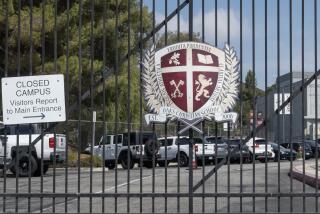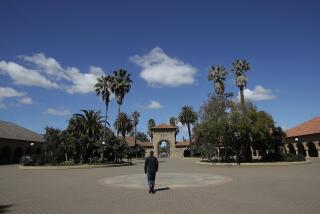Evangelical Schools Weigh Diversity Issue : Education: Christian colleges lag secular counterparts in recruitment of minority students, faculty.
As California universities debate the end of affirmative action, small, evangelical Christian colleges in California and throughout the country are being criticized from within for never getting much of a start.
Although ethnic minority students have grown from 11.8% of enrollment at 90 small Christian colleges to 14% over a seven-year period, that is well behind the 25% figure for colleges nationwide.
Faculty and students who are interested in the debate over racial and ethnic diversity on evangelical campuses will be taking part in two meetings on the issue this weekend in Grand Rapids, Mich.
About 300 students--white and minority--were expected for the ninth annual National Christian Multicultural Student Leadership Conference that began Thursday night at Calvin College there. At a nearby hotel, about 50 people are expected to attend the third meeting of the Alliance of Faculty and Staff of Color, which will hold workshops beginning today on minority recruitment and racism on campus.
Indicative of the shaky support for diversity on their campuses, they say, both groups are unsure that they can even attract enough money for their continued existence, which to date has depended on grants and short-term financial aid.
Some leaders of the push for diversity on evangelical campuses say the effort gets caught up in the backlash of secular debates.
“ ‘Politically correct’ is not scriptural, they say, and ‘multicultural’ means raising up race, they say,” injecting racial issues into religious concerns, said Sherry Jones, an African American administrator at Geneva College in Philadelphia.
“It seems like that for every two steps forward, we take 1 1/2 steps backward,” said Alvaro L. Nieves, who added that until this year, he was the only Latino among 150 faculty members at Wheaton College in Illinois.
Small Christian colleges are at a disadvantage in attracting minority students, faculty and administrators, according to both critics and defenders.
Pay is usually lower at evangelical colleges than at most public and private universities, and they are often located away from metropolitan areas with large minority populations.
“Fortunately, at Wheaton I’m near enough to Chicago so that I can go into town and get a Spanish-language ‘fix’ once in a while,” quipped Nieves.
In addition, many Christian schools require that students and faculty subscribe to evangelical beliefs, thus reducing the pool of prospects.
Many small, evangelical schools in largely white, rural settings do indeed have trouble attracting minorities, said Karen Longman, a vice president of the 90-school Coalition for Christian Colleges and Universities, headquartered in Washington, D.C.
Nevertheless, she added: “I think it is fair to say a substantial number of our colleges are working hard at recruitment. Because of the faith commitments of our colleges, there’s a special concern that Christian colleges model the fact that God loves and values diversity within the humanity that God created.”
Defenders of Christian colleges’ efforts contend that they are often outbid for qualified minority teachers.
An example is Dolores Jenerson-Madden, a professor of psychology and the first African American on the faculty of Southern California College in Costa Mesa, which is affiliated with the Assemblies of God. At last year’s meeting of the Alliance of Faculty and Staff of Color, “I got three job offers on the spot,” she said.
She remained at Southern California College, which she praised for providing a warm and supportive atmosphere.
“The very first semester I came here, I had to go Back East to visit my mother, who was very ill, and a faculty member who was on sabbatical came in and taught my classes,” she said. “That never would have happened at Cal State Fullerton, where I used to teach.”
Jenerson-Madden, 42, said Southern California College this fall has nearly 20% minority students, about half of them Latino. “It’s a slow improvement” in faculty and administration recruitment, she said, noting that an African American is now vice president for fund-raising and the faculty has three Latinos and one Native American, but no Asian Americans.
At The Master’s College in Newhall, an 850-student school considered especially conservative even within the Coalition for Christian Colleges and Universities, nonwhite enrollment has risen from about 6% to 15% in the last decade, said John Stead, a political studies professor and former vice president for academic affairs.
With faculty recruitment, it’s tougher, Stead said.
“The pool of qualified people is just not that large,” he said. “And nobody has that many openings--we can’t let a tenured faculty person go to bring in a minority.”
Stead said The Master’s College, whose president is fundamentalist Pastor John MacArthur of Grace Community Church in Sun Valley, is “struggling with the issue of diversity within a biblical institution” and with New Testament passages such as the admonition that “in Christ there is no Jew nor Greek,” interpreted as meaning that there should not be racial distinctions among Christians.
*
But he said college officials do object to accrediting agencies’ inquiries about the ethnic makeup of faculty and student bodies that may impinge on a college’s autonomy and to definitions of diversity that translate into preferential treatment for minorities.
Benjamin Lall, one of two minority professors on the 38-member faculty at The Master’s College, believes that their Christian beliefs should propel such religious campuses to the forefront of ethnic diversity rather than “shying away from it,” as he accuses them of doing.
Lall emphasized in interviews that he has no complaints about his own treatment as an associate professor of business administration at the college, where he has taught for 12 years. The 66-year-old native of India and longtime Christian was granted a sabbatical this year to work on a book about the diversity issue at Christian campuses.
Lall said the issue arose about five years ago at the campus, when the Western Assn. of Schools and Colleges, an accrediting agency for both religious and non-religious schools, asked The Master’s College to include a report on diversity along with its academic self-descriptions.
Last year, Lall surveyed a meeting of fellow business professors from Christian colleges and mailed identical questionnaires to administrators at other evangelical colleges, asking about minority ratios and attitudes toward affirmative action and diversity.
“When it came to ‘affirmative action,’ the reactions were very, very hostile,” Lall said. “They said it is reverse discrimination and against the white majority.”
But when he used different words, asking about “the goal of diversity on campus,” Lall found that most respondents called it desirable.
One professor said diversity was “somewhat desirable,” commenting, in part: “It is desirable only to the degree that it is achieved with virtual spontaneity as the institution is true to its mission. When it becomes an end in itself and is thus artificially achieved, it is counterproductive and destructive to all concerned.”
David Winter, president of Santa Barbara’s Westmont College, regarded as one of the academically elite Christian colleges in the country, likewise distinguished between “reverse discrimination” and diversity. Winter, presently chairman of the Western Assn. of Schools and Colleges, said he helped draft the accrediting body’s statement on diversity.
“The object is not just to have certain percentages or groups on campus, but to have the ability to celebrate differences and reconciliation between people of different ethnic and racial groups,” he said. Nonwhite enrollment at Westmont has climbed steadily to about 12%, Winter said.
Asked about charges of racism in recent years by African American students at Westmont, Winter said there have been “some people looking for incidents.” Words said or written in several cases “were very innocent, but they triggered . . . a conspiracy complex about another group,” Winter said.
“It became an opportunity for both sides to vent a great deal of their emotion,” he said. “It seems like every year we have more seminars and discussions on the topic.”
However, Rhonda Mundhenk, an African American who graduated from Westmont in 1994, said that racially offensive characterizations appeared on an audiotape circulated on campus, in the school newspaper and in e-mail messages, some of which she called “hate speech.”
“The general atmosphere on campus was especially unfriendly to black students,” she said. “We would find swastikas drawn on our desks and doors, but we could never get to the bottom of it,” said Mundhenk, now a law student at Northwestern University in Chicago.
Christian colleges historically have welcomed foreign students of color, partly because missionary work is central to evangelical churches, said George Jackson, the African American founder of the multicultural student conference now meeting in Grand Rapids.
“When they decided to push for diversity like other universities did across the country, I don’t think they thought their worlds were going to change,” Jackson said. “They had a missionary mentality--’We’ll give these poor folks a chance.’
“But things did change, and unfortunately, students want a faster rate of change than the institutions do,” said Jackson, who now works at a secular school, Butler University in Indianapolis, as an admissions official.
“They haven’t let go of the sin that holds them,” he said.
More to Read
Sign up for Essential California
The most important California stories and recommendations in your inbox every morning.
You may occasionally receive promotional content from the Los Angeles Times.










